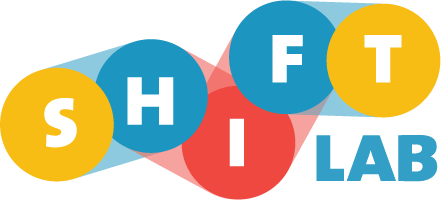Introducing the Shift Lab: Matt Ward
Curious about the folks who are participating in the Shift Lab? Wonder no more! Over the next three weeks, we will feature each of the Core lab team members (12 in all) as they tell us their thoughts about social innovation, racism and poverty in Edmonton, and why they joined the Shift Lab. On Thursday, we met Noelle. Today, meet Matt Ward. You can also check out Matt's bio here.
tansi.
hello.my name is matt, and welcome to my little blog post for you. i’m really excited to be working with such an amazing group of people who have spent a lot of time making their communities (and therefore all of our communities) better. i’m also really happy to be writing this from the traditional territory of treaty no. 6, and more particularly the land known to many as amiskwaciwâskahikan. as a gathering place, edmonton has historically fostered a space for diverse indigenous communities to come together and trade, share stories, and learn from one another. with the multitude of conversations surrounding us about reconciliation, residential schools, and pipelines, i want to enter into this post, and my work with shift lab, with the understanding that reconciliation cannot happen unless there are healthy relationships and restitution to build that reconciliation upon. this is exactly what excites me about shift lab, the bringing together of diverse communities to share our stories, knowledge, and experiences in order to better support communities affected by racism and poverty.
with indigenous peoples vastly over represented in experiences of poverty, homelessness, and housing insecurity, i think it’s important to remember that these experiences have been shaped by the trauma that canada has inflicted, and continues to inflict, upon indigenous peoples and that these experiences need to be incorporated into all discussions relating to poverty and racism in edmonton. the experiences of indigenous people and, more importantly, their resilience, is what brings me to the shift lab. to advocate for and centre those experiences. there cannot be reconciliation without critical, difficult, and informed discussions on the role colonialism has had to play in the multitude of indigenous and other racialized peoples experiences in canada, including edmonton. i’m excited for shift lab, not just because i thought it would be fun, but because it’s an opportunity to utilize socially innovative practices to address these experiences in interesting and powerful ways.
social innovation intrigues me, and my hope is that i can spend my time challenging the perception that social innovation has to be something new. in these discussions, we’ll be looking for effective, efficient, and sustainable ways to address the intersections of racism and poverty in edmonton. without a doubt there will be brand new ideas bounced off all the members of the core team, and those ideas will be integral to the success of the project. however, it’s still important to remember that there are ways older than the signing of treaties that have worked to develop healthy, safe, sustainable, and engaged communities. as a nêhiyaw person still learning their language and culture, i’m definitely not suggesting i have those answers or could even speak to what they are, but i know they exist and i’m excited to advocate for there to be a space for them in shift lab.
the next four months will be filled with a number of challenges. with a particularly cold winter expected, i suspect the core lab team members and myself will be reflecting a lot on how we’re personally implicated in systems and institutions that contribute to the intersections of poverty and racism. while i’ll be given the opportunity to take time off and spend time with family this holiday season, hundreds, if not thousands, of edmontonians will continue to struggle to make ends meet at no fault of their own. i think in this work we will be given an opportunity to pause for reflection, and think critically, while also reaching out to and supporting communities whose experiences’ are shaped daily by poverty and racism. i’m sure we’ll also be turning to models and resources that have addressed similar instances of poverty and racism and bring new life and hope into the work of poverty alleviation, addressing experiences of homelessness and housing insecurity, and bring a renewed urgency to addressing how many of these experiences are compounded by institutional and subversive racism. with such a strong intersection between the ideas that will be floating around the shift lab and the work that i do in planning & engagement in the non-profit housing sector, i’m really excited and fortunate to be able to be thinking about these ideas in different contexts and with different people in similar sectors across this city.
ultimately, i am excited. for a new challenge, a new experience, and a new way to think critically about racism and poverty in amiskwaciwâskahikan. i’m excited to engage with community members for all walks of life and experiences in order to learn, grow, and create solutions to make better this city, this land, this territory, i now call home.
hiy hiy,
matt ward
